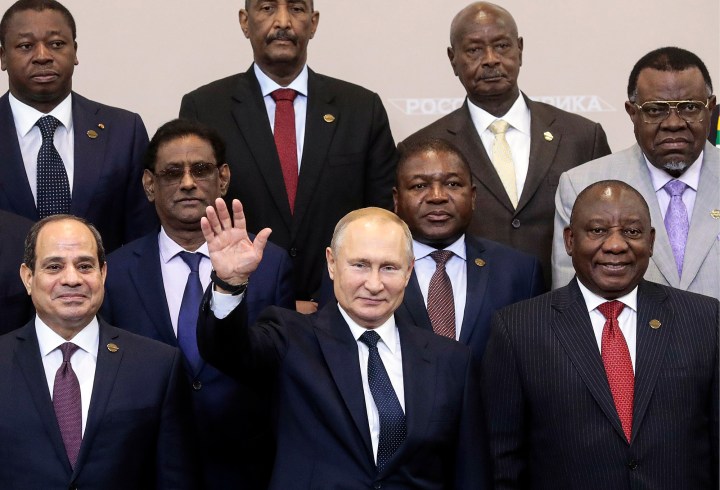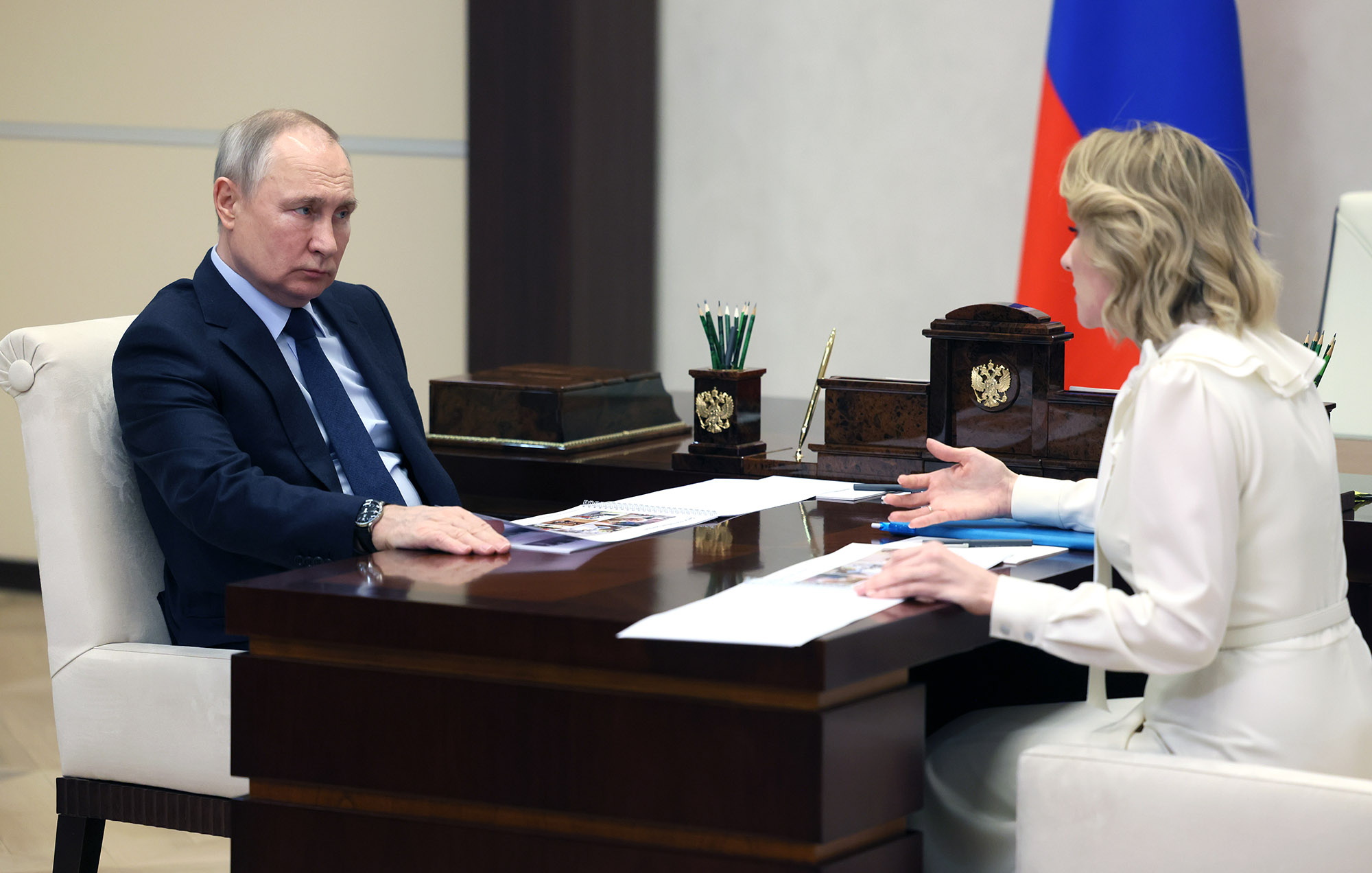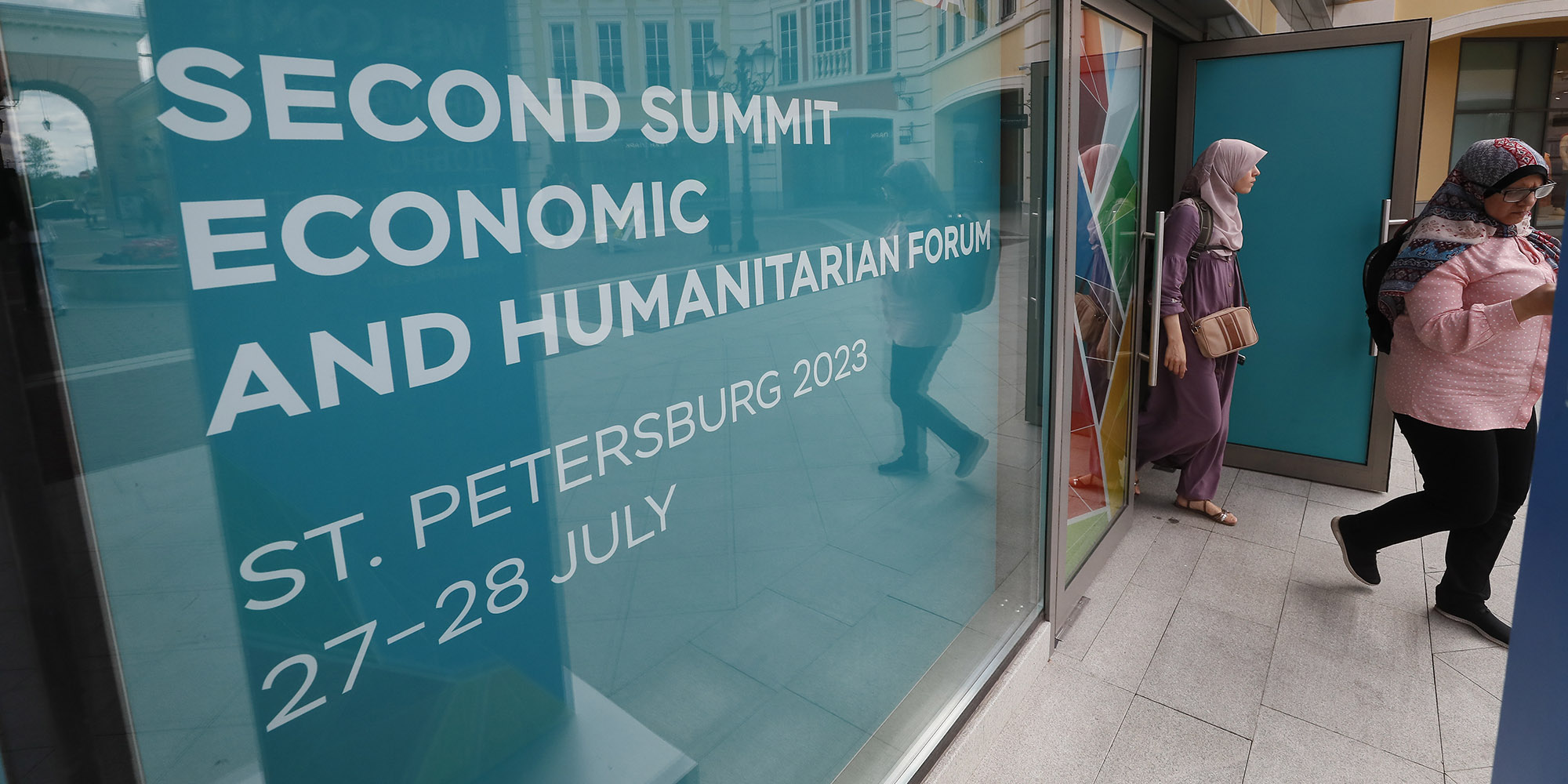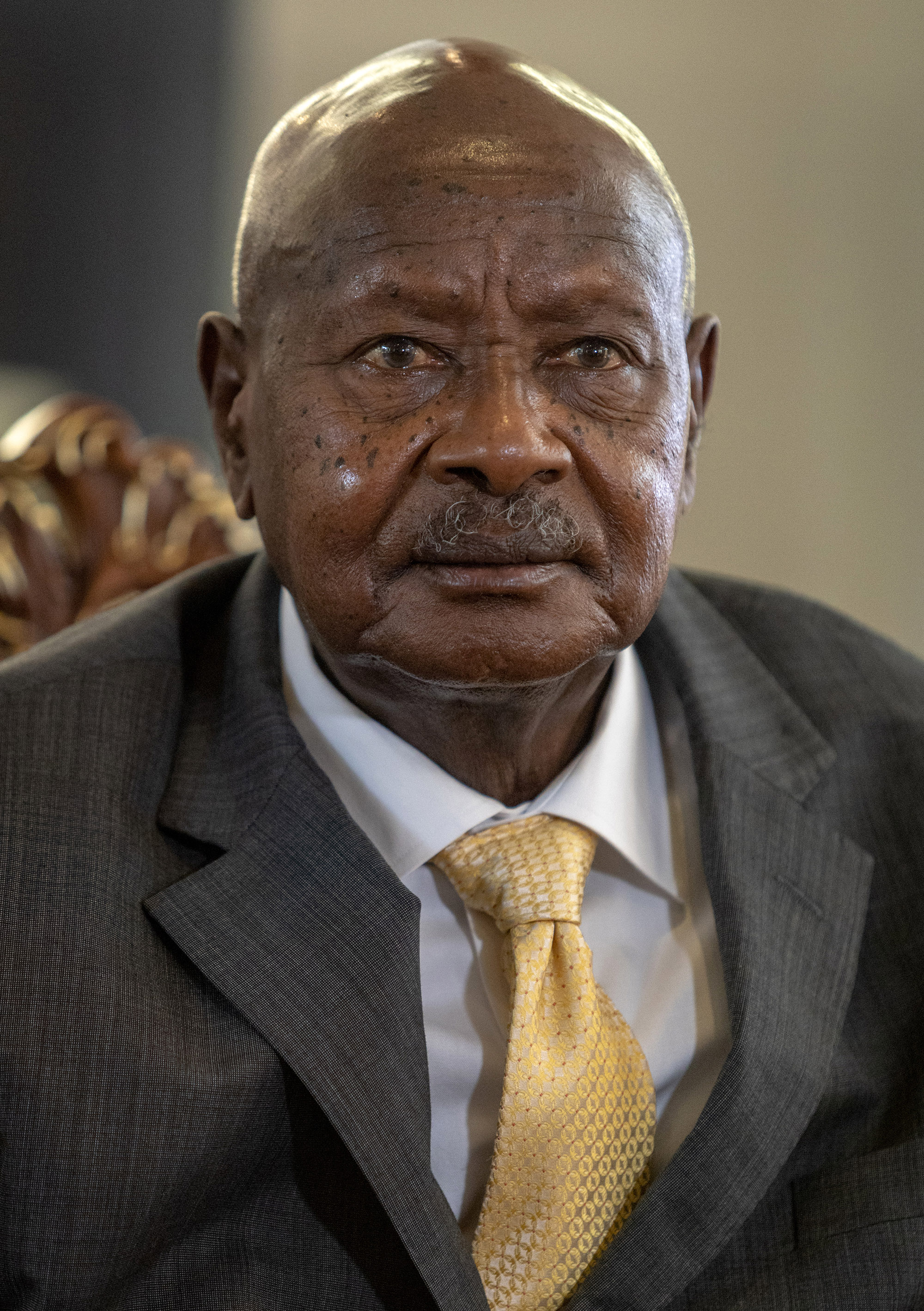ST PETERSBURG ANALYSIS
Russia-Africa summit will be largely a West-bashing exercise

Nearly 3,000 people, including about 40 South Africans, are scheduled to participate in the two-day Russia-Africa Economic and Humanitarian Forum this week. Expect lashings of irony.
The second Russia-Africa summit in St Petersburg this week, which President Cyril Ramaphosa will attend with Russian President Vladimir Putin and presumably many other African leaders, will be rich in anti-Western rhetoric – and irony.
The ironies will include Putin’s presidential commissioner for children’s rights, Maria Lvova-Belova, chairing a discussion on protecting children’s rights, a few months after she was indicted – along with Putin himself – by the International Criminal Court for abducting Ukrainian children and forcibly deporting them to Russia.

Russian President Vladimir Putin (left) meets Russian Presidential Commissioner for Children’s Rights Maria Lvova-Belova at the Novo-Ogaryovo state residence, outside Moscow, Russia, on 16 February 2023. (Photo: EPA-EFE / Mikhail Metzel / Sputnik / Kremlin Pool)
Another irony will be Russia offering Africans help in overcoming the continent’s food insecurity a week after Putin terminated the Black Sea Grain Initiative, which had lifted Russia’s blockade on Ukrainian ports to allow Ukrainian grain to reach world markets, including in Africa.
The title of the event itself could also be regarded as ironic.
While Russian missiles are blasting Ukrainian civilians and infrastructure, including grain silos in the country’s Black Sea ports, Russia has organised the “Russia-Africa Economic and Humanitarian Forum” to run alongside the summit of leaders.
At the first Russia-Africa summit in Sochi in 2019, the parallel event was only called an economic forum. This time, the “humanitarian” part has been added, presumably to try to soften Russia’s international image tarnished by its invasion of Ukraine.
A total of 43 African heads of state or government attended the Sochi summit and Putin is clearly hoping to attract more this week to demonstrate to the West that he is not isolated despite its efforts to sideline him with sanctions.
Read more in Daily Maverick: Ramaphosa forced to shrink Putin’s world to manage risk to SA’s global reputation, Agoa trade privileges
Nearly 3,000 people, including about 40 South Africans, are scheduled to participate in the two-day Russia-Africa Economic and Humanitarian Forum, though sources have told Daily Maverick that several business leaders and organisations declined invitations.
A partial list of 2,645 participants leaked last week by a Ukrainian activist website showed that most attendees – 1,619 – would be from Russia, with the second largest representation coming from Nigeria, with 102 participants. South Africa, with 39 participants on the list, was seventh, after Ghana (59), Burkina Faso (57), Cameroon (44) and Cote d’Ivoire (42).
Apart from the attendance of African leaders, the programme for the forum has also clearly been designed by Russia to try to mobilise the support of African governments in Moscow’s fight against the West.
‘Neocolonialism’
The overriding tone is: “We’re in this together – Russia and Africa – united against the greedy neocolonialist West trying to undermine our traditional values and impose liberal ones instead.”
So, for example, South Africa’s Deputy Minister of Public Enterprises, Obed Bapela, and Zimbabwean President Emmerson Mnangagwa are scheduled to participate in a panel discussion on “International Security in Times of Geopolitical Instability: Cross-Party Cooperation”.
The programme for that discussion says that the old geopolitical order, “already shattered to the core, has yet to be replaced by a new one”.

Participants in the Second Summit Economic and Humanitarian Forum Russia-Africa visit the accreditation centre in St Petersburg, Russia, on 25 July 2023. (Photo: EPA-EFE / Anatoly Maltsev)
It complains that “the Global North exploits its dominant position in the current system of international relations and continues to employ aggressive, neocolonial policies to achieve its goals”. It asks how Russia and Africa together can resist this neocolonialism.
Representatives of Angola’s MPLA, Namibia’s Swapo and the ruling parties of Gabon and the Republic of Congo, as well as senior Russian government officials, are also on the panel.
Bapela’s spokesperson Ellis Mnyandu confirmed that he would participate, and added it was important to note that Bapela was also the ANC’s deputy chair of international relations.
Joburg mayor
Johannesburg mayor Kabelo Gwamanda was scheduled to be an expert panellist discussing “Infrastructural Development, Innovation and Comfortable Urban Environment”, along with a few Russian city mayors. Their brief includes “sharing best practices” on building infrastructure “to create a favourable environment for business and attract foreign investors”.
This would have been another major irony, since Lillian Ngoyi Street (formerly Bree) in central Johannesburg exploded last week, tossing minibus taxis into the air after an underground blast caused by gas – either from leaking pipes or sewage – but probably infrastructural neglect in some form.
However, Anisa Mazimpaka, the city’s director for stakeholders management and community communications, told Daily Maverick that Gwamanda had pulled out of the forum “to ensure a rapid response and amongst others, timely restoration of services to the affected residents”.
Softer image
In an apparent effort to present a softer, gentler, more humanitarian, image of Russia, children’s rights commissioner Lvova-Belova will lead a discussion on “Cooperation in the Protection of Children’s Rights: Areas of Development and Forms of Interaction”.
The programme states: “The well-being of children and the organisation of an environment conducive to their development are priority areas of government policy in both the Russian Federation and African countries.”
And so the panellists, including Burundian Public Health Minister Sylvie Nzeyimana, Russian Deputy Foreign Minister Mikhail Bogdanov and Kenyan MP Beatrice Kadeveresia Elachi, are tasked to consider how Russia could help Africa uplift its children.
Read more in Daily Maverick: Russia tramples international law by abducting Ukrainian children, but South Africa can help get them home – here’s how
In another discussion on “Promoting Humanitarian Policy on the African Continent: Best Practices”, panellists will consider how to build on the supposed good work of Russian companies in conducting socially responsible business in Africa and promoting public-private partnerships to implement humanitarian, scientific and educational projects in Africa.
The best-known Russian company in Africa at present is probably the Wagner private military company/mercenary group with a modus operandi – in countries like Central African Republic and Mali – of propping up dictators by brutally suppressing political and economic opposition in exchange for mining contracts. There are signs Wagner intends to intensify its efforts in Africa.
Agricultural angles
In another discussion, panellists moderated by Irina Abramova, director of the Institute for African Studies of the Russian Academy of Sciences, will address ways of eradicating hunger in Africa, including by increasing supplies of Russian fertilisers and agricultural technologies.
The brief for this discussion managed to insert the question, “How can we reduce the risks of sanctions and restrictions?” as though this is a problem confronting both Africans and Russia.
The programme for “Russia and Africa: Partnership for Food Sovereignty” states that although agriculture employs more than 60% of Africa’s workforce and accounts for about a third of the continent’s GDP, Africa is the most food-insecure region in the world, with 278 million people – 20% of the continent’s population – facing hunger.
The brief says food imports, now at $55-billion a year, will double in monetary terms by 2030. Sanctions and the collapse of supply and production chains will continue to boost food inflation. So food imports are not the solution and so Russia must help boost Africa’s food sovereignty to address this critical hunger problem on the continent.
After Russia withdrew last week from the Black Sea Grain Initiative, which African countries highly valued, there is speculation that Russia will unveil at the summit a replacement grain export initiative which will cut out Ukraine.
This has not been confirmed and Ukrainian President Volodymyr Zelensky has proposed instead that the Black Sea Grain Initiative should continue without Russia and instead with Turkey, which helped broker the initiative in July 2022 with the United Nations, providing naval protection for the grain shipments.
‘New World Order’

Ugandan President Yoweri Museveni. (Photo: Guillem Sartorio / Bloomberg via Getty Images)
Ugandan President Yoweri Museveni is scheduled to participate in another West-bashing discussion at the forum on the “New World Order: From the Legacy of Colonialism to Sovereignty and Development”. The programme declares: “Many of today’s problems affecting the majority of the world, including Africa and Russia, are a direct consequence of the persistence of old colonialism and the imposition of renewed forms of colonialism.
“Conversely, the notorious prosperity of the West can be attributed to the rules of a predatory world order generated by this colonial legacy,” it says, claiming that, “The ‘golden billion’ continue to feed their prosperity and finance the maintenance of their ‘freedoms and values’ by siphoning off all kinds of resources from the majority of the world.
“Russia, Africa and most other countries do not agree to submit to such a diktat,” it states, asking the panellists to discuss how Russia and Africa can resist this “neocolonial… diktat”.
A couple of discussions are scheduled on how Russian and African media can collaborate to overcome the stereotypes about both Russia and Africa supposedly created in Western media. These include the apparent stereotype of Africa as a continent of conflicts, instability and many social problems, while Russia’s efforts to “address global challenges” are underreported. Top executives of the Russian state news agency TASS will feature prominently in these discussions.
A discussion on “Electoral Systems amidst Challenges to Electoral Sovereignty: Legislation and Technology” trumpets that, “The aggressive promotion of the geopolitical interests of American hegemony and the imposition of neoliberal values alien to many traditional societies have fractured the global system, turning ‘red lines’ into hotbeds of hostility.
“The battle waged by the Anglo-Saxons and their acolytes for resources for their own industry, markets for their goods, and congregations for their ideology recognises no bounds, driven by the ultimate goal of limiting the national sovereignty of those countries that refuse to align themselves, to destroy the institutions of their statehood and split society.”
It says elections are the perfect time for Western countries to intervene in developing countries, influencing their electoral systems, supporting pro-Western parties, funding NGOs and manipulating social media, deploying biased election observers, buying votes and generally interfering in the affairs of other nations, including Russia – even though it says Russian standards for accessibility, technological security, openness, and electoral accountability are “trend-setting”.
Read more in Daily Maverick: ‘Unscrupulous evil’ – as Alexei Navalny faces 20 more years in jail, he urges others to fight Russian authorities
Nuclear technology
Russia is also likely to aggressively push its nuclear power technology at the forum.
At the first Russia-Africa summit and economic forum in 2019, Russia’s atomic agency Rosatom was extremely active, signing agreements for nuclear cooperation with several African countries, though so far it is only building a nuclear power plant in Egypt. In St Petersburg, there will be a discussion on the prospects for greater nuclear technology to ensure energy security and to boost and decarbonise African economies.
South Africa’s Princess Mthombeni, founder of Africa4Nuclear – which promotes nuclear technology – is scheduled to participate in the discussion, with Rosatom officials and ministers or officials from Algeria, Tanzania, Egypt, Rwanda, Zimbabwe and Burundi, which have all shown an interest in nuclear energy.
Religion
Russia will also try to mobilise religion to harness itself to Africa against the West, judging by the outline for a discussion on the “Religious Component in the Development of African Countries in a Rapidly Changing World” panel.
It says African societies revolve around traditional religious moral norms, but the West has tried to propose an alternative understanding of morality, to “expand the institution of family and marriage and make other societal changes that are sinful from the point of view of traditional religions and are strongly rejected in African countries, and this brings them closely in line with Russia”.
This is clearly a veiled reference to Western support for LGBT rights. The programme urges Africa and Russia to cooperate “in upholding traditional values and defending each other’s interests against the advance of liberalism”.
The forum programme also claims that as a result of Russia supporting Africa in the struggle against apartheid and colonialism, and the training in Russia of tens of thousands of Africans who now occupy high government positions, “the word ‘Russia’ is now perceived with warmth and love” in Africa.
Accordingly, one panel will discuss how the International Russophile Movement can be advanced in Africa. The programme does not point out that it was the Soviet Union – which included Ukraine – and not just Russia that supported African liberation movements.
Several other panels will discuss Russia-Africa cooperation in energy, IT, vaccine development and other healthcare, science and technology sectors, as well as prospecting for diamonds and minerals.
If the first forum in Sochi is a guide, Russian arms for sale will be on prominent display. DM
Daily Maverick foreign policy specialist Peter Fabricius’ accreditation for the Russia-Africa Summit in St Petersburg this week was rescinded by the Roscongress Foundation, the Russian government body which is organising the forum.

















Russia – humanitarian- sickening beyond belief?? It never has been and will never be, especially headed by one so bestial, murderous, criminal and evil as the Putin monster. One only has to look at who is attending to realise that, bar a couple here and there, the rest including SA, are nothing but a bunch of losers, brutal dictators, predators and thieves who have denigrated and stolen their countries blind to the detriment of their citizens. This is nothing but a typically Russian speciality – lies, smoke/mirrors, misinformation, deception and propaganda. You start an illegal and unjustified one man’s war by being a deranged KGB thug, you kill and destroy a neighbour, you kidnap thousands of their children, you destroy your neighbour’s ability to harvest and export their grain and now the “ chief midget orc in shining armour” arrives to the rescue of the 3rd world and South. Only a sick and highly limited and twisted mind would buy such a travesty.
What a mouthful of hate
Perhaps you need to read Bill Browder’s “Freezing Order” for one, but then no doubt you will discount it as being Western propaganda! None so blind as those that will not see!
Sadly there’s no cure for stupid.
A speech bubble is desperately needed in the lead image. Why is the small white man the only one waving? DM readers, please make my day.
Can anyone explain why millions of African migrants want to live in Europe/USA and nobody is keen on moving to Russia? Do they know something Ramaphosa and these dimwitted participants of this utterly useless West-bashing summit don’t know?
The sad part is that much of the criticism of the west is justifiable; the sadder part is that what Russia has to offer as an alternative is very much worse.
Economic power depends largely on a country’s internal dynamics, such as an efficient workforce, technological literacy, good governance, property rights, rule of law, sound infrastructure and efficient public services. African governments regard all of these things, somehow, as ‘Western’ and therefore ‘unAfrican’ and they are always looking for short cuts. Ironically, whenever our Marxist anti-capitalist government fails, they look to our much-maligned (Western-oriented) private sector for help.
A mouthful of truth Jana. Perhaps you live in a twilight world where Putin and his Russia are not the murderous beasts. Hate, murder, terror, destruction, kidnapping and genocide is what Ukraine experiences every day at the hands of the diabolical Putin. Chechnya and Syria did as well. You are obviously happy to turn a blind eye to it all as it doesn’t affect you personally – you are a world away but I guarantee you 100% that you would not last a day under the Putin regime. N